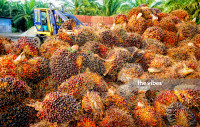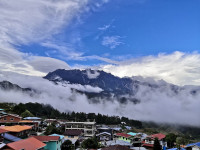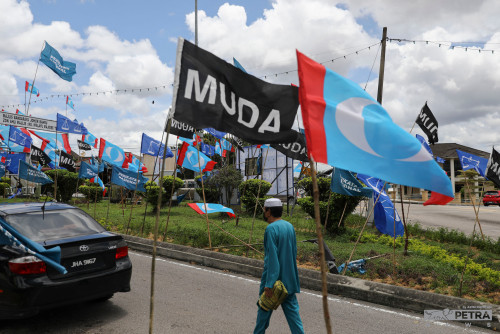ZAMBIA and Malaysia are continents apart, yet it is not difficult to draw parallels between both countries.
There is a shared colonial history: Zambia achieved independence from the British just a year after Malaysia was established (or seven years after Merdeka). While former colonial powers exploited Malaysia’s tin deposits, Zambia’s copper was, and still is, an important resource. Both countries continued to use English after independence, and nowadays balance that with the many other languages spoken in either country.
Zambia hosts an ethnic Indian population and also has an economically important Chinese community, though it is much more recent than Malaysia’s. While the proportions are quite different, Zambia has much the same religious mix as Malaysia, along with a not entirely dissimilar substrate of traditional animistic beliefs.
Namwali Serpell’s debut novel, ‘The Old Drift’, spans more than a century, tracing Zambia’s history all the way from Livingstone ‘discovering’ Victoria Falls and naming them for his queen, despite the fact that the people living there were already perfectly aware of the giant cataract and had long since called it, and continue to call it, Mosi-oa-Tunya, literally ‘The Smoke That Thunders’.
“He speculated that angels had gazed upon it and said, ‘How lovely.’ He opined, like a set designer, that there really ought to be mountains in the backdrop,” writes Serpell.
Along with Livingstone, we are given a cast of hapless boorish adventurers encamped along the stretch of the Zambezi River upstream from the waterfall. Like Livingstone and his wife, they fall prey to fevers and drop like flies, but not before generally behaving obstreperously.
Then the action shifts to Italy, with a peculiar story of a young woman afflicted with an unstoppable growth of hair that covers her entire body. It reads something like a piece of speculative fiction or a fairy tale. Such attention to detail is given in this story that the reader assumes it will be significant for what unfolds later, but any such expectations are forestalled.
The story soon moves back to Africa and takes a different direction. Though this is a novel, parts of it can be read as short fiction, and while there is some overlap between the sections, in history or geography at least, it isn’t entirely linear in terms of character development or plot.
It is often hard to know what this book is about or where it is going. It demands to be taken at face value, yet paradoxically invites the reader to probe its deeper meanings.
Essentially there are three principal female characters, their daughters, and their granddaughters, but it is hard to keep a track of who is who and how they are related, which seems to be a very deliberately obtuse ploy on the part of the writer.
Another story features a woman who weeps incessantly. Instead of unstoppable hair growth we are given unstoppable tears. Yet another character, a wealthy young English woman, who plays tennis, or tries to, despite being blind, literally doesn’t see the colour of the young African man she has fallen in love with. He subsequently whisks her away to Africa, where his British public-school accent is not enough to give him access to the strata of society he aspires to belong to.
How metaphorical some of these images might be is left entirely to the reader, though it is hard not to draw some inference.
The novel swings from the lampooning escapades of a team of would-be Afronauts and their plans to travel into space (apparently based on real events), to the politics of extended families, to the tribulations of sex workers.
There’s a strong feminist subtext, with the patriarchy represented in many different forms, though mostly in ways that highlight ineptitude rather than malice.
‘The Old Drift’ might be classified as an experimental novel. It is certainly an unusual one, defying easy definition. There is a sense that a lot is happening off camera that might explain what is going on, but the writer isn’t interested in giving the reader any easy answers.
On a sentence level ‘The Old Drift’ is exceptionally well written, often veering closer to poetry than prose, or wavering along a line between the two, one foot in either camp.
In many ways its beautifully crafted sentences are its most immediately graspable strength, even if the relationship between the different elements of this long and meandering book is never fully apparent.
But if the reader is kept in the dark, so are the characters, never really understanding the roles they have been allotted, yet sometimes, despite this, determined to play them as valiantly as they can, while others passively submit to dictates that fall beyond their control or ken.
On a certain level it might be seen as a novel about what it means to be human, and just how confusing and mystifying that experience can be.
At times this is a frustrating book, the reader wandering lost in an unfamiliar landscape in a way that might echo the characters encountering Africa for the first time in the earlier sections. But many of the African characters seem at least equally befuddled.
While reading, it is hard to shake the impression that the writer is as interested in puppeteering the book’s readers as its characters, but to what end, at risk of laboring the point, is never entirely clear.
What is clear though is that Serpell is interested in raising issues of class and colour. Born of a Zambian mother and an English father, Serpell’s heritage is mixed. Expatriated, she is a professor of English at Harvard University. She has written a book of essays, and another of literary criticism, as well as various award-winning short stories.
Her academic and cultural heritage may go some way to explaining the extraordinary fact of this cerebral and often impervious debut novel. Or these facts might have no bearing whatsoever. A book so open to multiple layers of interpretation leaves plenty of room for second guessing.
As a piece of literature, it represents a landmark, not just for Zambian writing, but for African writing, or Post-Colonial writing, if such reductive labels are even helpful.
If you are the kind of reader who enjoyed Gabriel Garcia Marquez’s sprawling novel, ‘One Hundred Years of Solitude’, and would like something similar but more challenging, a book that leaves you questioning pretty much everything about everything – which might be said to be one of this novel’s enduring strengths – then this is definitely the book for you.
But if you prefer your reading to include tidy plots coupled with clear narratives, then you might want to give this one a wide berth.
In sum, ‘The Old Drift’ is not a book that gives up its meanings easily, but it is beautifully written all the same. – The Vibes, February 27, 2021























